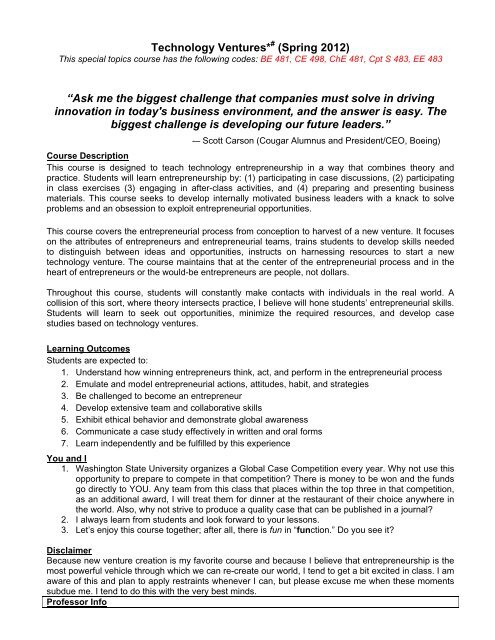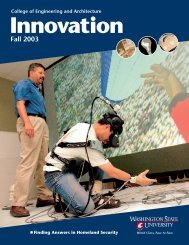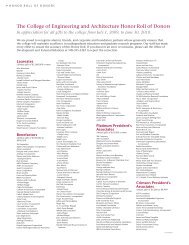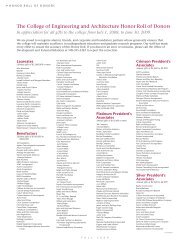Technology Ventures* (Spring 2012) “Ask me the biggest challenge ...
Technology Ventures* (Spring 2012) “Ask me the biggest challenge ...
Technology Ventures* (Spring 2012) “Ask me the biggest challenge ...
You also want an ePaper? Increase the reach of your titles
YUMPU automatically turns print PDFs into web optimized ePapers that Google loves.
<strong>Technology</strong> <strong>Ventures*</strong> # (<strong>Spring</strong> <strong>2012</strong>)<br />
This special topics course has <strong>the</strong> following codes: BE 481, CE 498, ChE 481, Cpt S 483, EE 483<br />
<strong>“Ask</strong> <strong>me</strong> <strong>the</strong> <strong>biggest</strong> <strong>challenge</strong> that companies must solve in driving<br />
innovation in today's business environ<strong>me</strong>nt, and <strong>the</strong> answer is easy. The<br />
<strong>biggest</strong> <strong>challenge</strong> is developing our future leaders.”<br />
-– Scott Carson (Cougar Alumnus and President/CEO, Boeing)<br />
Course Description<br />
This course is designed to teach technology entrepreneurship in a way that combines <strong>the</strong>ory and<br />
practice. Students will learn entrepreneurship by: (1) participating in case discussions, (2) participating<br />
in class exercises (3) engaging in after-class activities, and (4) preparing and presenting business<br />
materials. This course seeks to develop internally motivated business leaders with a knack to solve<br />
problems and an obsession to exploit entrepreneurial opportunities.<br />
This course covers <strong>the</strong> entrepreneurial process from conception to harvest of a new venture. It focuses<br />
on <strong>the</strong> attributes of entrepreneurs and entrepreneurial teams, trains students to develop skills needed<br />
to distinguish between ideas and opportunities, instructs on harnessing resources to start a new<br />
technology venture. The course maintains that at <strong>the</strong> center of <strong>the</strong> entrepreneurial process and in <strong>the</strong><br />
heart of entrepreneurs or <strong>the</strong> would-be entrepreneurs are people, not dollars.<br />
Throughout this course, students will constantly make contacts with individuals in <strong>the</strong> real world. A<br />
collision of this sort, where <strong>the</strong>ory intersects practice, I believe will hone students’ entrepreneurial skills.<br />
Students will learn to seek out opportunities, minimize <strong>the</strong> required resources, and develop case<br />
studies based on technology ventures.<br />
Learning Outco<strong>me</strong>s<br />
Students are expected to:<br />
1. Understand how winning entrepreneurs think, act, and perform in <strong>the</strong> entrepreneurial process<br />
2. Emulate and model entrepreneurial actions, attitudes, habit, and strategies<br />
3. Be <strong>challenge</strong>d to beco<strong>me</strong> an entrepreneur<br />
4. Develop extensive team and collaborative skills<br />
5. Exhibit ethical behavior and demonstrate global awareness<br />
6. Communicate a case study effectively in written and oral forms<br />
7. Learn independently and be fulfilled by this experience<br />
You and I<br />
1. Washington State University organizes a Global Case Competition every year. Why not use this<br />
opportunity to prepare to compete in that competition? There is money to be won and <strong>the</strong> funds<br />
go directly to YOU. Any team from this class that places within <strong>the</strong> top three in that competition,<br />
as an additional award, I will treat <strong>the</strong>m for dinner at <strong>the</strong> restaurant of <strong>the</strong>ir choice anywhere in<br />
<strong>the</strong> world. Also, why not strive to produce a quality case that can be published in a journal?<br />
2. I always learn from students and look forward to your lessons.<br />
3. Let’s enjoy this course toge<strong>the</strong>r; after all, <strong>the</strong>re is fun in “function.” Do you see it?<br />
Disclai<strong>me</strong>r<br />
Because new venture creation is my favorite course and because I believe that entrepreneurship is <strong>the</strong><br />
most powerful vehicle through which we can re-create our world, I tend to get a bit excited in class. I am<br />
aware of this and plan to apply restraints whenever I can, but please excuse <strong>me</strong> when <strong>the</strong>se mo<strong>me</strong>nts<br />
subdue <strong>me</strong>. I tend to do this with <strong>the</strong> very best minds.<br />
Professor Info
John (Kalu) Osiri<br />
Ph.D., Analytical Chemistry, Louisiana State University, Baton Rouge, LA.<br />
Post-Doc., International Business and Entrepreneurship, University of Florida, Gainesville, FL.<br />
Hobby: Ping pong You are welco<strong>me</strong> to <strong>challenge</strong> <strong>me</strong> anyti<strong>me</strong> at <strong>the</strong> University Recreation Center.<br />
This Class Meets on Mondays, Wednesdays and Fridays at 3:10 P.M. in Todd 109<br />
Email: jk.osiri@wsu.edu Please reference: Student – <strong>Technology</strong> Ventures<br />
Office: Todd 431A; Office phone: (509) 335-3057; Office hours: By appoint<strong>me</strong>nt<br />
“The world is desperate for leaders that would dare to innovate, that would<br />
fearlessly chart a new course in history.”<br />
-– John Kalu Osiri (Cougar Faculty)<br />
Work Load<br />
Entrepreneurship is a high energy endeavor both in preparation and execution.<br />
Discussions<br />
During class periods, I will introduce a topic from <strong>the</strong> textbook and <strong>the</strong>n delve into discussions.<br />
Students should co<strong>me</strong> ready to ask questions and provide <strong>the</strong>ir own insights. So<strong>me</strong>ti<strong>me</strong>s, we will play a<br />
video in class. The video content will motivate or inspire you. It will also spur discussions. Case Study<br />
preparation is a must to be successful in this course. All <strong>the</strong> cases used throughout this course<br />
describe real situations. You will learn from <strong>the</strong>m. Students must read each case and co<strong>me</strong> prepared<br />
for discussions. Cases will be role played by student groups. You can prepare for <strong>the</strong> cases<br />
individually or in groups, whatever works best for you. I will call on anyone at any ti<strong>me</strong> to answer any<br />
question from <strong>the</strong> case. Of course, students are permitted to speak freely and to speak up in class,<br />
even when <strong>the</strong>y are not called upon. Flipping through <strong>the</strong> pages during class is a sure way of indicating<br />
that you had not studied <strong>the</strong> case.<br />
Case Studies<br />
Each student will write a Case Study on an existing technology venture. The Case Study will be<br />
presented twice – in <strong>the</strong> middle, and at <strong>the</strong> end of <strong>the</strong> term. Term-end presentations will be done as a<br />
competition in front of business professionals. These professionals will decide your final grade based<br />
on <strong>the</strong>ir judg<strong>me</strong>nt as to whe<strong>the</strong>r or not your Case Study accurately depicts <strong>the</strong> company in question.<br />
Students can produce an entrepreneurship paper or write a Business Plan in lieu of <strong>the</strong> Case Study.<br />
Recom<strong>me</strong>nded Textbook and Notebook<br />
1. <strong>Technology</strong> Ventures: From Idea to Enterprise, Thomas H. Byers, Richard C. Dorf, and Andrew<br />
J. Nelson, Third Edition, McGraw-Hill.<br />
2. Notebook to docu<strong>me</strong>nt ideas, <strong>me</strong>etings, decisions, reflections, disappoint<strong>me</strong>nts, etc.<br />
Submitting Assign<strong>me</strong>nts<br />
All assign<strong>me</strong>nts are to be submitted by 11:59 pm of <strong>the</strong> due date. Docu<strong>me</strong>nts submitted after this ti<strong>me</strong><br />
will not be graded. This <strong>me</strong>ans that late assign<strong>me</strong>nts will automatically be assigned zero points.<br />
Assign<strong>me</strong>nts should be formatted using <strong>the</strong> following specifications. Margins: 1 inch margins all around;<br />
Font: Ti<strong>me</strong> New Roman or Arial; Font Size: 11 or 12; Spacing: 1;<br />
Grading<br />
1) Classroom Participation and Exercises 20<br />
2) Assign<strong>me</strong>nts 10<br />
3) How Well Did You Live Out <strong>the</strong> Five Di<strong>me</strong>nsions of Entrepreneurial Orientation 10<br />
4) Final Case Study (or Research Paper or Business Plan) 60<br />
Total 100
Students with Physical or Learning Disabilities<br />
Reasonable accommodations are available for students with a docu<strong>me</strong>nted disability. Please visit <strong>the</strong><br />
Disability Resource Center (DRC) during <strong>the</strong> first two weeks of every se<strong>me</strong>ster to seek information or to<br />
qualify for accommodations. All accommodations must be approved through <strong>the</strong> DRC. To make an<br />
appoint<strong>me</strong>nt with a disability counselor, call (509) 335-3417 or email drc@wsu.edu.<br />
Course Policies<br />
Punctuality, attendance and participation are expected. On daily basis, points would be deducted for<br />
being late or for missing class. Assign<strong>me</strong>nts must be submitted on <strong>the</strong> due date. Failure to do so will<br />
result in a grade of zero for that particular assign<strong>me</strong>nt. Assign<strong>me</strong>nts are not accepted after <strong>the</strong> due<br />
date. No food or drink is allowed in <strong>the</strong> classroom. Students are expected to remain in class <strong>the</strong> entire<br />
duration (50 min); <strong>the</strong>refore, leaving to stretch, get a snack, get a drink, smoke a cigarette, or go to <strong>the</strong><br />
bathroom is disruptive and inappropriate. There is a zero tolerance policy for electronic communications<br />
(cell phones, text <strong>me</strong>ssaging, emailing, “facebooking”, etc.) during class. If an e<strong>me</strong>rgency exists and a<br />
student must be reachable during <strong>the</strong> class period, arrange<strong>me</strong>nts must be made with <strong>the</strong> instructor<br />
prior to <strong>the</strong> beginning of class. Based on <strong>the</strong> judg<strong>me</strong>nt of <strong>the</strong> instructor, students may be penalized<br />
using <strong>the</strong> point-deduction system and/or by being asked to leave if <strong>the</strong>ir behavior is disruptive to <strong>the</strong><br />
class.<br />
Professional Behavior<br />
You are expected to uphold <strong>the</strong> WSU Standards of Conduct for Students in all respects. Because this<br />
course strives to develop you as a professional, you must also demonstrate professional behaviors that<br />
include: communication honesty, work competence, financial responsibility, property ownership,<br />
protection of o<strong>the</strong>rs, and social responsibility. You are encouraged to collaborate with o<strong>the</strong>rs to<br />
advance your project work, but you assu<strong>me</strong> full responsibility for <strong>the</strong> integrity and originality of <strong>the</strong><br />
academic work you submit. You must give appropriate credit for o<strong>the</strong>rs’ work you use in advancing<br />
your own work. If you violate professional codes of ethics or WSU standards of conduct, corresponding<br />
assign<strong>me</strong>nts are subject to a failing grade. Repeated offenses will be reported to <strong>the</strong> Office of Student<br />
Conduct. If you have any questions about <strong>the</strong>se require<strong>me</strong>nts, please speak with <strong>the</strong> instructor or visit<br />
<strong>the</strong> Office of Student Conduct in <strong>the</strong> Lighty Student Services Building, Room 190.<br />
“What should exist? To <strong>me</strong>, that's <strong>the</strong> most exciting question imaginable.<br />
What do we need that we don't have? How can we realize our potential?”<br />
-– Paul Allen (Cougar Alumnus and Co-Founder of Microsoft)<br />
*This syllabus was adapted from a sample provided by <strong>the</strong> co-author of New Venture Creation: Entrepreneurship for <strong>the</strong> 21 st Century – Professor Stephen Spinelli<br />
(for<strong>me</strong>r Faculty at Babson College, Massachusetts and President of Philadelphia University). I am grateful to Professors Joe Harris (Cougar Alumnus and Faculty)<br />
and Leon Prieto (Savannah State University, Georgia). They copiously shared <strong>the</strong>ir teaching experience and course syllabi with <strong>me</strong>. I also thank Professor William<br />
(Bill) Rossi for suggesting so<strong>me</strong> of <strong>the</strong> experiential exercises that have been incorporated in this course. He is Associate Director at <strong>the</strong> Center Entrepreneurship<br />
and Innovation (CEI) and CEI Faculty Fellow at <strong>the</strong> University of Florida-Gainesville).
# This syllabus is subject to change at any ti<strong>me</strong>.





